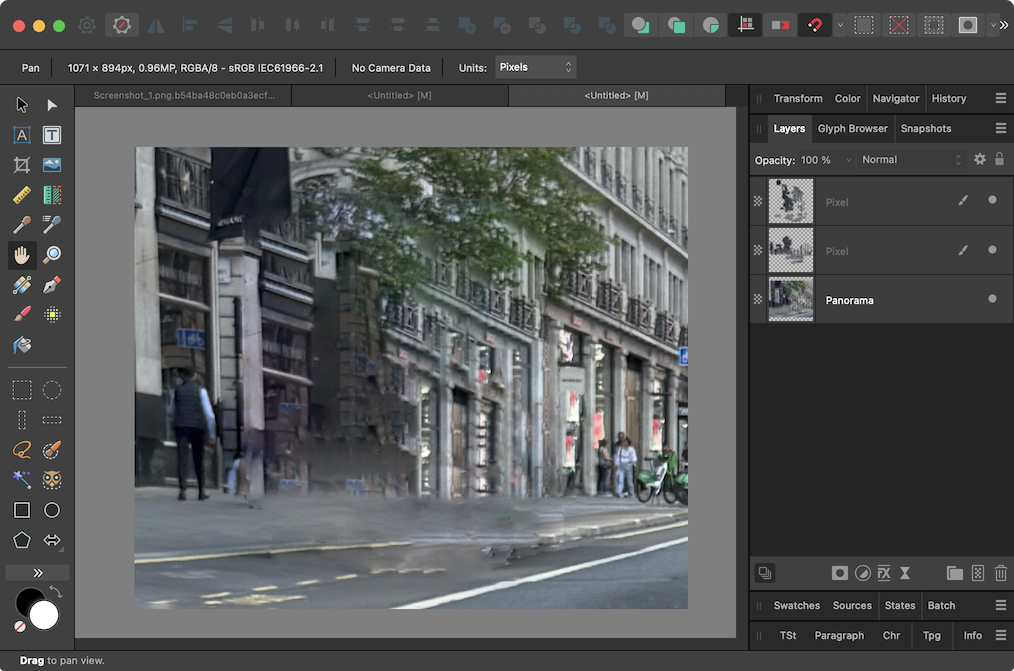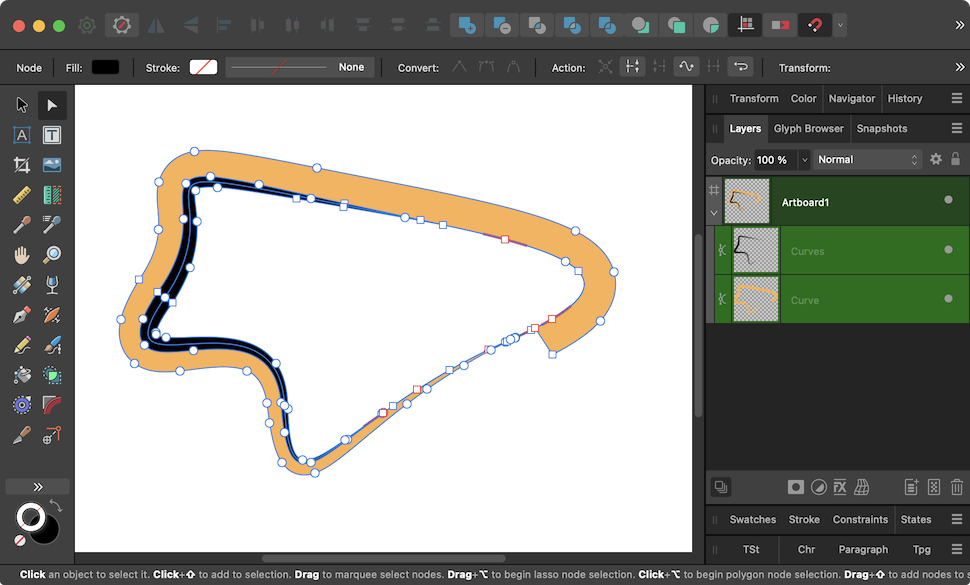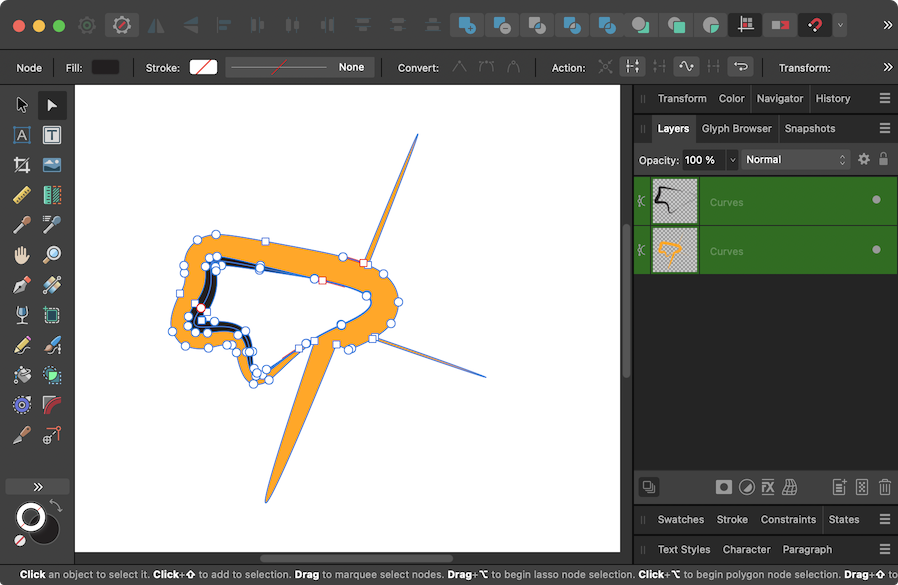-
Posts
6,949 -
Joined
Everything posted by loukash
-
My apologies for omitting the [sarcasm][/sarcasm] tags. If I would travel all the way back in time, I have been also "indoctrinated" by Aldus PageMaker, Aldus FreeHand, QuarkXPress et al before even entering the Adobeverse. It always takes time to make a switch from a tool you were able to handle in your sleep. There was a time about 30 years ago when I knew QXP v3 and v4 inside out, off the top of my head. Everything. Some of my custom keyboard shortcuts in Affinity are still based on that.
-
Well, some of us Affinity users (like yours truly) have even wasted years at art schools to learn the basics of graphic design first. Or, some others (also like yours truly) have been so indoctrinated for decades by the Ubiquitous Adobe Cult that it took them another few years to switch their mindset to fully understand what they're now dealing with as Affinity users. (Spoiler: it worked out fine for me ) In other words: Take your time. Be patient. Also, please don't be rude on the forum to "make a point". If only there were a trial version of Affinity to check everything out before the purchase… Oh, wait! https://affinity.serif.com/trial
-
This would be certainly very odd. For me, it saves the intermediate scan into a /private/var/folders/(…) subdirectory which is for temporary files. That's on MacOS Ventura. Haven't tried on newer OS though. I don't think so. I'm the owner, too. That said, I vaguely remember having seen similar behavior before as well. But I don't remember in which context it was or if it was with Affinity or another app. Some 3rd party apps can definitely get confused by the MacOS "app package" concept and treat them as regular folders.
-
You must be a genuinely lucky person if you perceive this as "real pain"… Place the Image Capture app in your Dock and then: Because clicking an existing icon in your Dock will cause you about as much "pain" as navigating to the File menu in APh and selecting the "Acquire Image" menu item anyway. Then follow the setup procedure I've linked to. If you don't want Image Capture to live in your Dock, set it up like this: This complete workflow can be run by a few keyboard shortcuts. To set it all up will take you a one-time investment of a few minutes which will be worthwhile if you…
-
Even better than Dropbox: pCloud allows you to select any individual local folders and link/sync them to any individual folders on pCloud. Whereas the virtual pCloud Drive is more or less a "bonus" for adding even more folders and files that you explicitly don't want to store and sync locally. But given it's a virtual drive, they are in fact stored locally as well, albeit hidden (on Mac) in the ~/.pcloud/Cache/cached disk image. At least that's how I use it. It's a very flexible concept.
-

Does the Serif development team still exist?
loukash replied to JpLaf's topic in Desktop Questions (macOS and Windows)
Of course "it isn't" because you've just made this up. Please learn to quote properly rather than spreading misinformation. ^ emphasis mine. I, for one, am not a "professional photographer", but I surely am a "creative professional". And so are allegedly millions *) of other Affinity users. Vive la grande différence. *) Disclaimer: That all said, I'd also take the "millions" claim with at least a small grain of salt. A few years ago it's been publicly reported that there were at least 3 millions Affinity licenses sold, but how many "millions" of them actually are "creative professionals" remains anyone's guess. But that's how marketing works in general. -
You're in Designer, so you have activated the Vector Crop Tool. This will crop single objects, not the canvas. It has no adjustable attributes in the context toolbar. Confusingly, the Vector Crop Tool uses the same icon as the canvas Crop Tool in Photo. Duh. The Vector Crop Tool does basically the same thing as if you simply nest objects inside a plain rectangle shape. Nothing more. (For the record, I haven't ever used it since I got Designer some 10 years ago… ) In other words: User error, not a "bug"…
-

16 bit CMYK mode please
loukash replied to kirk23's topic in Feedback for the Affinity V2 Suite of Products
Yes, there is. I think Affinity even supports them, but it doesn't display them. So is there even such a high end CMYK printer where you could even tell, say, Y23.5 from Y23.6? Let alone such a "high end eagle eye" that can spot it in print…? -

16 bit CMYK mode please
loukash replied to kirk23's topic in Feedback for the Affinity V2 Suite of Products
Hardly, when usually we work with integer values from 0 to 100 per CMYK channel… -
No. Why? You don't need the resource anymore if you copy the content into your layout directly. For what it's worth, this how I've been working e.g. with 3rd party vector logos since decades: Often I'd be receiving some bloated or malformed EPS files (at best, because it could get worse than that). Then I'd "crack them open" via Illustrator, clean up, save a backup *.ai, copy the curves into my InDesign layout, and save them into my custom ID library (which would "translate" as Assets in Affinity). Like this, I'd be using the logos as native InDesign objects, with all benefits that it has. In Affinity, I'm doing basically the same. (Except that it gets harder to "crack open" 3rd party EPS or AI files without having access to my old MacBook with Adobe CS5.5…) Anyway… Do you have an example of such a "tedious" workflow that you could upload? I'm genuinely interested.
-
To be able to edit "in place", simply copy the content of the linked/embedded document and paste it. Then you'll logically have a set of native layers for live editing. Otherwise, how should a document know that you're currently editing content of a different document? Besides, this very separation of contents is the exact feature here, not a "flaw" or something.
-

Inpainting brush tool is disappointing
loukash replied to T Chalklen's topic in Desktop Questions (macOS and Windows)
Ha, a fun challenge! Ingredients: object selection tool mask PNG export with transparency fake panorama mode with auto inpaint manual inpaint -
Obviously… Of course it does. Or to put it more precisely: it's expected to do it. Definitely. What happens here is that Expand Stroke ignores the Align Stroke To Outside setting and expands as if it were Align Stroke To Center. It's a bug. That said, this bug is still somewhat manageable because you can work around it relatively easily: double the stroke width expand voilà: … as opposed to the old Expand Stroke algorithm in v2.4.2 and older, which had its own weird quirks and, er… excrescences:
-

Affinity Photo 2.6.3 MacOs vs Windows
loukash replied to jorospa's topic in Desktop Questions (macOS and Windows)
Hear hear. The difference between my MacBook Pro mid-2012, i7 2.6GHz, 16GB RAM, 2TB SSD upgrade, and the MacBook Air M2 15" from 2023, 24GB RAM, 2TB SSD, is just stunning. -

Publisher won't let me change leading spacing
loukash replied to Ryan Clarke's topic in Desktop Questions (macOS and Windows)
But as noted, in 99% of all cases you do not want to "override". Override may have a special use as a fancy gimmick, e.g. when you want to increase leading for just a few lines inside a paragraph. This video explains it pretty well: Also, I was not exactly correct saying that you "can't underride": You can "underride" (i.e. override by decreasing leading), but only if at least a whole line is selected. Selecting only a part of a line and override can only increase the leading. -

Publisher won't let me change leading spacing
loukash replied to Ryan Clarke's topic in Desktop Questions (macOS and Windows)
Ah, could be…








